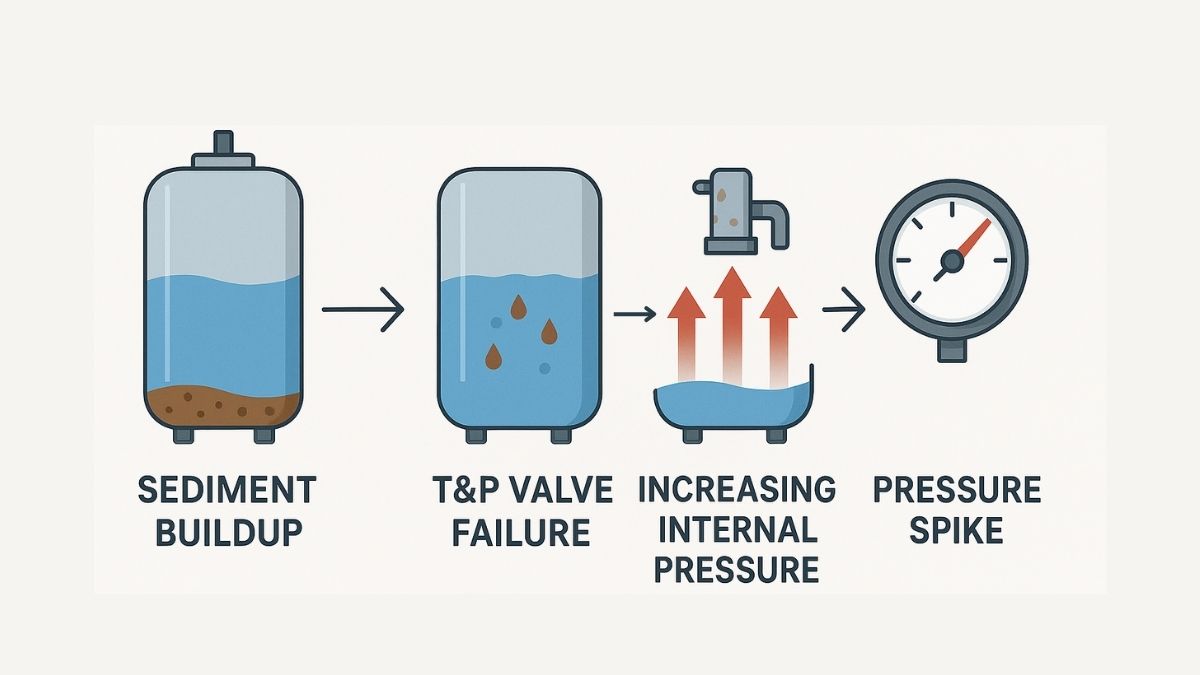Did you know that nearly three quarters of water heaters fail—often suddenly—and can cause devastating damage? According to an IBHS‑backed study, 69 % of all water heater failures result in significant property damage, tacking on over $3,000 beyond replacement costs. Understanding the causes of water heaters to explode isn’t just fascinating—it’s essential for every U.S. homeowner.
In this blog, we’ll dive into why heaters burst, how you can spot trouble early, and what you should do next.
How Water Heaters Work | Pressure, Temperature & Safety Mechanisms
Every tank‑style water heater is a closed system. As water warms, it needs more room. That causes the pressure inside the tank to rise. To keep things safe, manufacturers fit a Temperature & Pressure (T&P) relief valve. If pressure or heat climbs too high, the valve cracks open. That stops the build‑up before it becomes a problem. Modern setups also include an expansion tank. It acts like a shock absorber. When water expands, the extra volume slips into that little tank instead of stressing the main one.
Gas heaters add another layer of defense. They use Thermal Release Devices (TRDs) on the burner assembly. If the heat or flame gets out of hand, the TRD shuts off the gas flow. In electric models, a similar cutoff switch kills power when things get too hot. Plus, most units have a high‑limit thermostat. It trips if water temperature exceeds set limits.
Together, these parts work like a team. But only if they’re in good shape. That’s why regular checks and simple tests matter so much for every homeowner.
Common Causes of Water Heater Explosions
Experts agree there are six primary causes water heaters to explode:
- Excessive Pressure Levels: When the T&P valve sticks or is absent, pressure climbs until the tank gives way.
- Gas Leaks & Combustion Ignition: In gas models, a small leak can fill an enclosed space. A pilot light or spark then triggers an explosion.
- Sediment Buildup: Minerals settle at the tank bottom, insulating water from the burner. Overheating spikes pressure—and may warp the tank.
- Anode Rod Failure & Rust Corrosion: The sacrificial rod degrades over time. Once corrosion reaches the steel shell, weak spots can rupture under pressure.
- Over‑Temperature Settings: Every degree above 120°F adds ~4 psi of pressure. High thermostat settings without an expansion tank spell danger.
- Electrical Malfunctions: Faulty heating elements or wiring in electric units can cause hot‑spots and uncontrolled boiling.

Warning Signs Homeowners Must Watch
Catch problems early by noting these “heater explosion warning signs”:
- Popping or Knocking Noises: Indicates sediment hitting heating elements. (More on knocking noises: Water Heating Noise Knocking.)
- Brown or Rust‑Colored Water: Sign of corrosion and anode rod depletion.
- Leaking Around the T&P Valve: The valve may be stuck open or failing to reseal.
- Rotten‑Egg (Sulfur) Odor: Hints at bacterial growth or failing anode rod.
- Visible Tank Deformation: Bulges or warping signal imminent rupture.
So understanding “What would cause a water heater to explode?” early—like noticing strange noises—can save your home and wallet.
U.S. Water Heater Explosion Statistics
Below is a snapshot of key U.S. data on water heater failures:
| Statistic | Value |
| Average cost per failure | $4,444 after deductible |
| Percentage of failures by year 12 | ~75 % |
| Failures causing sudden bursts or leaks | 69 % |
Burst incidents are when excessive pressure or corrosion causes a tank rupture.
Explosions—far rarer—combine mechanical failure with ignition sources, leading to blast‑level events.
Prevention & Maintenance Best Practices
Keeping your system in top shape dramatically reduces risk. Follow these essential steps:
| Maintenance Task | Frequency | Benefit |
| Flush the Tank | Annually | Removes sediment that causes overheating |
| Inspect/Replace Anode Rod | Every 2–3 years | Prevents internal corrosion |
| Test T&P Valve (lift lever) | Biannually | Confirms pressure relief works |
| Install/Maintain Expansion Tank | One‑time/As‑needed | Absorbs thermal expansion |
| Professional Safety Inspection | Yearly | Full system check by licensed plumber |
Moreover, keep combustible materials away from gas units and ensure proper venting. For a step‑by‑step guide, check out Water Heater Maintenance in Orlando.
When to Call The Romans Plumbing
Some issues demand immediate professional help:
- Gas Smell Nearby: Evacuate and call 911, then us.
- Continuous Leaks or No Pressure Relief: Risk of silent pressure build‑up.
- Rapidly Rising Temperatures or Loud Hissing: Indicates runaway overheating.
The Romans Plumbing offers 24/7 emergency repairs, routine tune‑ups, comprehensive safety inspections, and full replacements in Orlando & Surrounding Communities. Don’t wait—book your service today or explore our Troubleshooting Guide for common fixes.
Wrap Up
By understanding the root causes water heaters to explode—from gas leaks to valve failures—you can protect your home and family. Stay vigilant for warning signs, follow simple maintenance, and call The Romans Plumbing at the first hint of trouble. Your safety—and your peace of mind—depend on it.
FAQs
Can sediment alone cause a heater to explode?
Yes. Over time, sediment traps heat, spiking internal pressure if the T&P valve fails.
What’s the safest thermostat setting?
120°F is ideal. Higher temperatures increase pressure by about 4 psi per degree and can risk explosion.
Do all homes need an expansion tank?
Any closed‑loop system (with a backflow preventer) requires one. It prevents dangerous pressure surges.



